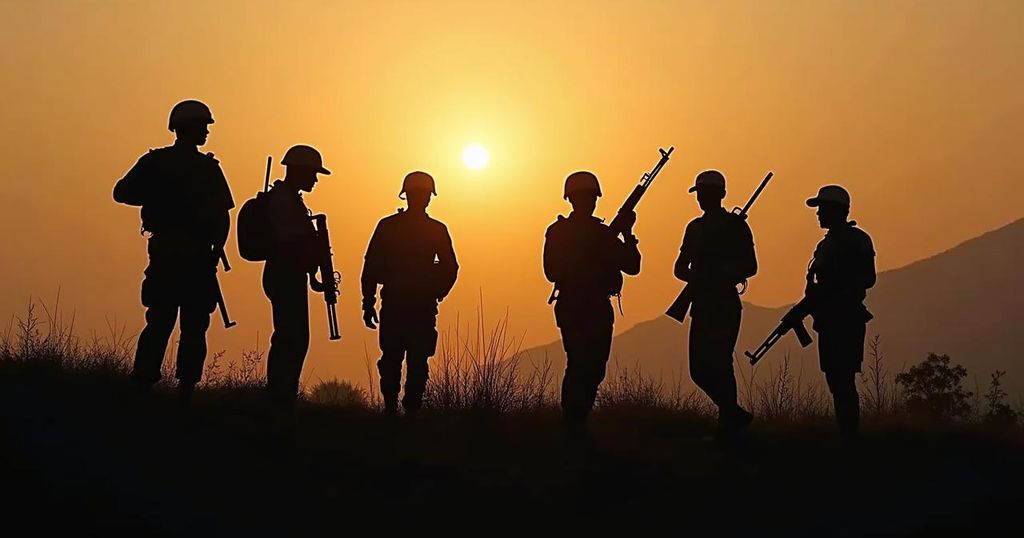HRW Accuses Rwandan Forces and M23 Rebels of Atrocities Against Civilians in DRC
Human Rights Watch has accused Rwandan forces and the M23 rebel group of committing severe atrocities against civilians in the eastern Democratic Republic of the Congo. The ongoing conflict has led to significant humanitarian crises, including indiscriminate violence, sexual abuses, and forced military recruitments, particularly affecting displaced populations in North Kivu. HRW calls for urgent investigations and protective measures to safeguard vulnerable civilians.
Human Rights Watch (HRW) has published a compelling report on the grave humanitarian situation in the eastern Democratic Republic of the Congo (DRC), emphasizing the atrocities committed against civilians amidst ongoing military confrontations between Rwandan forces and the M23 rebel group. As these armed entities advance towards the strategic town of Sake, a substantial number of local residents and over half a million internally displaced individuals are exposed to heightened risks of violence and humanitarian crises. The M23, an armed group led predominantly by Tutsi fighters, has received support from Rwanda since its resurgence in 2021. The group is implicated in numerous atrocities directed at civilians, which include indiscriminate assaults, sexual violence, and the forced recruitment of children into armed conflict. Despite the international community’s continuous appeals for peace, Rwanda’s alleged backing of the M23 exacerbates the perilous situation, particularly in North Kivu, a region severely affected by conflict. The displacement camps near Goma have become notable hotspots for violence, reflecting the profound consequences of the ongoing strife. The Shabindu-Kashaka displacement site in North Kivu has emerged as a focal point of concern. In early April, this location was subjected to rocket fire from both Rwandan military forces and M23 combatants, leading to the tragic death of a 19-year-old, in addition to widespread destruction of makeshift shelters. Furthermore, on May 3, additional strikes targeted residential neighborhoods, resulting in the loss of at least 17 civilian lives, including the majority being children. HRW underscores the deteriorating humanitarian conditions within the Kanyaruchinya camp, where individuals reportedly face unlawful detention and extortion by the Wazalendo fighters. Victims have described being confined in makeshift holding areas, known as “kiboro,” and recounted experiences of violence and abuse during these detentions. The report alarmingly notes a troubling trend of sexual violence, with numerous survivors attesting that their assailants often wore military uniforms. With incidents of sexual violence reported at a rate of 50 to 100 cases weekly in specific camps, the situation calls for immediate protective measures. Such acts of sexual violence in conflict zones meet the definition of war crimes under international law. The actions described in HRW’s report are indicative of potential violations of international humanitarian law, specifically the Fourth Geneva Convention, which aims to protect civilians during armed conflict. Unlawful detention and extortion fall under the realm of war crimes as delineated by the Rome Statute of the International Criminal Court. HRW has urged both Congolese and Rwandan authorities to initiate thorough investigations and to hold accountable those responsible for war crimes, particularly in cases involving sexual violence, grounded in the principle of command responsibility. In addition, the organization calls for comprehensive humanitarian aid for all at-risk civilians, including vital legal, social, and medical assistance for survivors of sexual violence. To enhance the protection of civilians from the consequences of explosive weapons, HRW encourages both nations to endorse the 2022 Political Declaration on Strengthening the Protection of Civilians from the Humanitarian Consequences Arising from the Use of Explosive Weapons in Populated Areas. Lastly, HRW highlighted the importance of the UN, EU, and other international organizations in closely overseeing military assistance to both parties, ensuring that such aid does not lead to further human rights violations and that the applicable standards are consistently upheld.
The eastern Democratic Republic of the Congo has been a site of prolonged conflict, marked by the resurgence of the M23 rebel group, which has been involved in numerous human rights abuses against civilians. Notably, the involvement of foreign forces, particularly those from Rwanda, has complicated the already volatile situation, leading to significant humanitarian crises characterized by large-scale displacement, violence, and a lack of basic humanitarian assistance. Human Rights Watch’s recent report sheds light on specific incidents of civilian suffering and calls attention to the urgent need for accountability and protection for vulnerable populations amid this ongoing turmoil.
In summary, the report by Human Rights Watch outlines severe allegations against Rwandan forces and the M23 rebel group concerning their treatment of civilians in the Democratic Republic of the Congo. With evidence of numerous atrocities, including sexual violence and forced recruitment, the situation demands immediate and concerted action from local and international authorities. The urgent need for accountability, humanitarian assistance, and strengthened civilian protections is critical to alleviating the suffering of those affected by the conflict.
Original Source: www.jurist.org




Post Comment